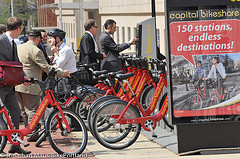We knew this was coming.
With bike share finally moving forward in Portland, we could count on The Oregonian to do their best undermine it before it even hits the street. Why? Because it’s about bikes, it’s new — and most importantly — because it is something championed by Mayor Sam Adams.
Before sharing some snippets of The O piece, let’s do a reality check: Bike share is becoming like bus service in cities across America. It’s a reliable, affordable, popular, easily-accessible system that opens up bicycling to new audiences in new places. Even before trying a modern system out for myself in Washington D.C. last week, I was generally positive about bike share. After trying it out, I’m convinced. It’s a game-changer and the early wrinkles have been ironed out. Sure, D.C. is not Portland, but we will have a right-sized system and I’m confident the people who put ours together will be the best and brightest in the field.
But forget all that. The Oregonian’s editorial board thinks it’s a risky investment rife with uncertainty and something that only left-wing European cities are willing to try.
In predictable form, their editorial focuses squarely on Sam Adams. Here’s their lede:
Portland Mayor Sam Adams wants his city to have a bike-sharing program well underway by the time he leaves office. As he said about such programs in a promotional video released by his staff, “I like them. They’re cool.”
He’s right, of course. What’s not to like about bike kiosks sprinkled liberally throughout the urban core? What could be cooler than Portland joining the ranks of cities such as Montreal or Paris with well-known bike-sharing programs?
But the coolness of bike sharing has never been in question. The uncertainties surrounding this initiative are the same ones pedaling alongside many Adams-related initiatives: how to pay for it and how to make it work in real life, not just in promotional material.
And then they sprinkle in some doomsday rhetoric full of unsubstantiated claims with no basis in reality:
The potential potholes are numerous, as other cities have learned. One risk is cost overruns: Depending on the structure of the contract, a city can end up backfilling the budgets of private vendors to cover extra costs related to rampant vandalism, unexpected logistical problems or insufficient advertising revenue.
Theft has also posed a challenge for many bike-sharing programs. Even rental kiosks with so-called third-generation technology, allowing vendors to track bikes electronically, can struggle with chronic losses. The systems for check-in and check-out are improving fast, but not yet enough to mitigate the risk.
Theft and vandalism? Really? If you ask people who actually run today’s best systems — like Streetsblog did in their 2010 post titled, Theft and Vandalism Just Not a Problem For American Bike-Sharing — they’ll say neither are much of a problem. I follow this stuff pretty closely and I don’t recall a single headline about theft or vandalism in recent years.
Then they bring up “the helmet question”:
Trickiest of all could be the helmet question: Portland doesn’t require adult bicyclists to wear helmets, yet the city streets can be mortally dangerous for bicyclists sharing the road with buses, delivery trucks and frazzled car commuters. What to do about helmets is a debate that rolls safety, logistics, liability and bike politics into one.
While I appreciate The Oregonian’s concern for bike safety (even though it feels paternalistic when they write about it), they don’t mention that PBOT addresses the issue in their Request for Proposals. In it, PBOT asks all potential vendors to consider helmet dispensing machines at the rental kiosks and one line in the RFP reads, “Describe your plan to provide helmets for bike sharing users.”
In conclusion, The Oregonian says, “Cool ideas and “free” federal money get you a long way in Portland, but people need more proof that a bike-sharing program would provide a true public benefit — without anyone getting taken for a ride.”
PBOT has studied bike share extensively for several years. We have some of the best expertise in the country right here in our own backyard. I’m not saying we (the media, the citizens) should just give PBOT a free pass and trust them to do everything right; but at this point, the only remaining thing Portland can do to prove whether or not bike share will work is to move forward as planned and get the system on the ground.
Whether you like the paper or not, what The Oregonian says matters. Politicians read it, candidates read it, other media outlets read it, and a large number of your fellow citizens read it. That’s why it will be important to watch their coverage closely as bike share develops. Stay tuned.


